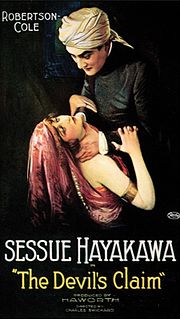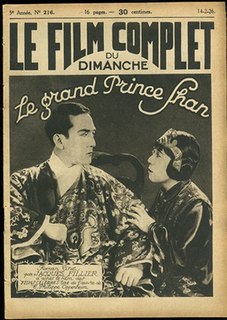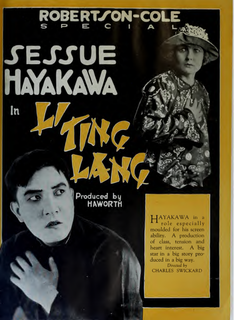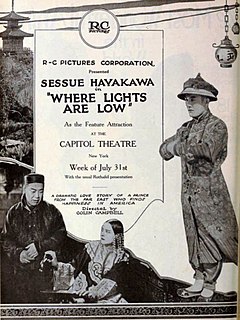Related Research Articles

Kintarō Hayakawa; June 10, 1886 – November 23, 1973), known professionally as Sessue Hayakawa, was a Japanese actor and a matinée idol. He was one of the most popular stars in Hollywood during the silent film era of the 1910s and early 1920s. Hayakawa was the first actor of Asian descent to achieve stardom as a leading man in the United States and Europe. His "broodingly handsome" good looks and typecasting as a sexually dominant villain made him a heartthrob among American women during a time of racial discrimination, and he became one of the first male sex symbols of Hollywood.

The Devil's Claim is a 1920 American silent drama film starring Sessue Hayakawa and Colleen Moore. A print of this film survives.

The Swamp is a 1921 American silent drama film released by the Robertson-Cole Pictures Corporation and directed by Colin Campbell. The film was written and produced by Sessue Hayakawa, who also co-stars with Bessie Love. A print of this film is preserved at the Gosfilmofond archive in Moscow.
The Geisha is a 1914 American short silent film, directed by Raymond West and using music by Sidney Jones from the stage musical The Geisha. The film features Sessue Hayakawa, Tsuru Aoki, Frank Borzage, Ramona Radcliffe and Henry Kotani in important roles.
A Relic of Old Japan is a 1914 American silent short drama film directed by Reginald Barker and Thomas H. Ince. Sessue Hayakawa, Tsuru Aoki, Frank Borzage and Henry Kotani played important roles in the film.

The Courageous Coward is a 1919 American silent drama film directed by William Worthington and featuring Sessue Hayakawa and Tsuru Aoki in lead roles. It is presumed to be a lost film, with only reel 5 preserved at the EYE Film Institute Netherlands film archive.

The Village 'Neath the Sea is a 1914 American silent short adventure film directed by Thomas H. Ince and Jay Hunt. Sessue Hayakawa, Tsuru Aoki, Lone Bear and Ernest Swallow played important roles in it.

The Death Mask is a 1914 American short drama film directed and produced by Thomas H. Ince and featuring Sessue Hayakawa and Tsuru Aoki in prominent roles.
The Chinatown Mystery is a 1915 short silent mystery film directed by Reginald Barker and featuring Howard C. Hickman, Leona Hutton, Sessue Hayakawa and Tsuru Aoki in important roles.

A Heart in Pawn is a 1919 American silent drama film directed by William Worthington. Sessue Hayakawa's Haworth Pictures Corporation produced the film and Worthington played the lead role along with Vola Vale and his wife Tsuru Aoki.

Bonds of Honor is a 1919 American silent film directed by William Worthington. Sessue Hayakawa's Haworth Pictures Corporation produced the film and he himself played the leading roles along with his wife Tsuru Aoki. Marin Sais, Dagmar Godowsky, Herschel Mayall, Toyo Fujita and M. Foshida also appeared in the film.

The Great Prince Shan is a 1924 British silent drama film directed by A.E. Coleby and featuring Sessue Hayakawa, Ivy Duke, Tsuru Aoki, Valia, David Hawthorne, Fred Raynham and Henry Vibart in important roles. The film is adapted from the 1922 novel of the same title by E. Phillips Oppenheim. It was made at Cricklewood Studios by Stoll Pictures, the largest British production company of the era. Location shooting took place on the French Riviera. It was one of two films former Hollywood star Hayakawa made for Stoll along with Sen Yan's Devotion released later the same year.
Sen Yan's Devotion is a 1924 British drama film directed and written by A.E. Coleby. Sessue Hayakawa, Tsuru Aoki, Fred Raynham, Jeff Barlow and Tom Coventry featured in the film.
Banzai is a 1918 American short film starring Sessue Hayakawa and produced by his Haworth Pictures Corporation.

The Man Beneath is a 1919 American silent crime drama film directed by William Worthington and produced by Sessue Hayakawa's Haworth Pictures Corporation. An incomplete copy of the film is in the collection of the EYE Film Institute Netherlands.

The Illustrious Prince is a 1919 American drama film directed by William Worthington and produced by Sessue Hayakawa's Haworth Pictures Corporation.

The Tong Man is a 1919 American thriller film directed by William Worthington and produced by Haworth Pictures Corporation.

The Beggar Prince is a lost 1920 film directed by William Worthington and produced by Sessue Hayakawa's Haworth Pictures Corporation.

Li Ting Lang is a 1920 American silent drama film directed by Charles Swickard and produced by Sessue Hayakawa's Haworth Pictures Corporation.

Where Lights Are Low is a 1921 American silent drama film directed by Colin Campbell and starring Sessue Hayakawa, Tôgô Yamamoto, and Goro Kino.
References
- 1 2 3 Miyao, Daisuke (7 March 2007). Sessue Hayakawa: Silent Cinema and Transnational Stardom. Duke University Press. p. 333. ISBN 978-0-8223-8982-8.
- ↑ Friar, Ralph E.; Friar, Natasha A. (1972). The only good Indian: the Hollywood gospel. Drama Book Specialists. p. 129. ISBN 978-0-910482-21-9.